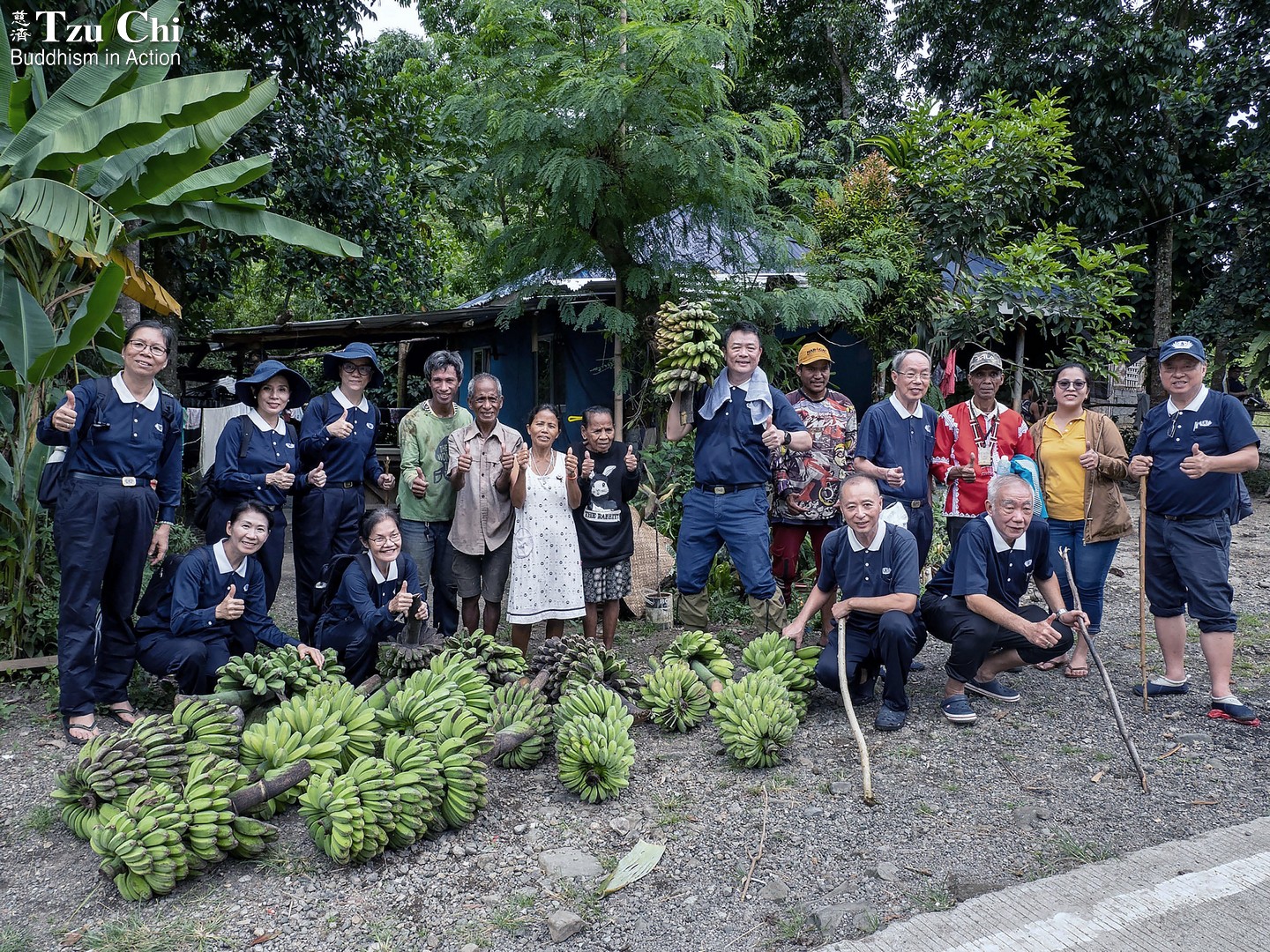Sowing Seeds of Change—A Banana Planting Project in Davao, the Philippines
By Ben Baquilod
Photo by Harold Alzaga
Sowing Seeds of Change—A Banana Planting Project in Davao, the Philippines
By Ben Baquilod
Photo by Harold Alzaga

Residents of Santo Niño, Talaingod, Davao del Norte, joined Tzu Chi's agricultural poverty alleviation project. With the assistance of volunteers, they implemented an economic model that has improved their living conditions.
"I am not the only one experiencing joy here. All the families who have planted banana trees are happy too," said Eric Parcon, who, along with fellow farmers, was harvesting banana bunches in Santo Niño, Talaingod, Davao del Norte, in the Philippines' Davao Region. Tzu Chi volunteers from Davao and Manila joined them, promptly purchasing their harvests and providing them with immediate earnings.
Eric and the other farmers couldn't have imagined this scenario before 2022. That year, he and 40 other families from the Ata Manobo tribe began participating in Tzu Chi's banana planting livelihood project in Talaingod. Prior to that, Eric relied solely on planting corn and abaca. These crops took 4 and 12 months, respectively, to harvest. Unfortunately, he could only get around 10,000 pesos (US$170) for corn and 8,000 pesos (US$137) for abaca. This equated to a total income of 38,000 pesos (US$650) per year, or approximately 3,000 pesos (US$52) per month. This was a paltry sum, especially for a young father of three.
"It was truly insufficient," remarked Armando Dusonan Jr., Eric's brother-in-law and a fellow farmer. The meager income from their harvests every four months only allowed them to enjoy rice—a luxury for them—for a brief week. After that, they would revert to their customary routine of eating only once a day, mostly relying on cassava.
Food wasn't the only challenge in their community. Living in a remote rural area, they also faced difficulties accessing electricity, information, and medical care. "Whenever our children fell ill, we couldn't afford a trip to the hospital due to financial constraints," said Armando. "Our earnings weren't even enough to meet our daily needs."
But a transformation has taken place for Armando, Eric, and their community since Tzu Chi's banana planting livelihood project in Talaingod began to show results. In the summer of 2023, the banana seedlings they planted 19 months earlier started providing them with a consistent harvest of new fruit every two weeks, eliminating the months of waiting for income.
"I've seen the improvement in their lives ever since, and it genuinely warms my heart," said Ariel Garao, the volunteer in charge of the project. "What's beautiful about this project is its sustainability as long as they continue to work on it."
Tzu Chi volunteers in Davao started working with the indigenous peoples of Talaingod when the pandemic started in 2020. They saw how difficult the lives of the Ata Manobo were and recognized their need for assistance. In response, they distributed rice and other groceries in Talaingod to help residents through the pandemic. They later followed up with the banana planting project, providing seedlings, organic fertilizers, and technical expertise. Although the banana plants grew more slowly due to the use of organic fertilizers and sustainable farming practices, the quality and quantity of the fruit were exceptional. By August 2023, the trees were heavily laden with fruit, and new shoots began to emerge after harvesting.
For Eric Parcon's family, the banana planting project has alleviated some of the challenges of their poverty-stricken life. "Compared with eating only once a day before, we can now enjoy three meals a day with rice and viand," he shared. "We also get to savor our banana produce. It's truly delicious!"
Fortunately, their community now has electricity, and Eric was able to purchase a TV, providing them with access to news and information, as well as a bit of entertainment. "After a tiring day, it's nice to watch TV with my family and unwind," he said, smiling.
He proudly mentioned that he can now give some money to his children when asked for candy. "As a father, it pained me when I couldn't provide for them," he said, teary-eyed. "But now, even if it's just for candy, I feel so happy when I see their joy."
With a steady income from banana harvests, Eric and Armando were able to acquire a motorcycle through monthly installments, improving transportation to the market where they sell and buy goods for their families. "Previously, we had to walk for six hours to reach the market. Now, it takes us only half an hour," said Armando, with a sigh of relief.
Armando can also now provide an allowance to his young children for school. "Before, they would go to school with nothing. Now, I can give them five pesos, and they're ecstatic," he exclaimed. "That makes me happy as well."
Armando holds one dream for his children—to receive a good education and lead better lives in the future. "I will continue to plant bananas for them to finish school," he affirmed.
Tzu Chi's Livelihood Improvement Programs
● Indonesia: Great Love Mobile Noodle Stall Lending Program for small vendors.
● The Philippines: Training in dental assistance, business marketing, welding, computer repair, and customer service English. Tricycles and driver training for Typhoon Haiyan survivors.
● Nepal, India, South Africa, and Myanmar: Sewing classes.
Contact Us | Plan a Visit | Donate
8 Lide Road, Beitou 11259, Taipei, Taiwan
886-2-2898-9999
005741@daaitv.com
©Tzu Chi Culture and Communication Foundation
All rights reserved.
